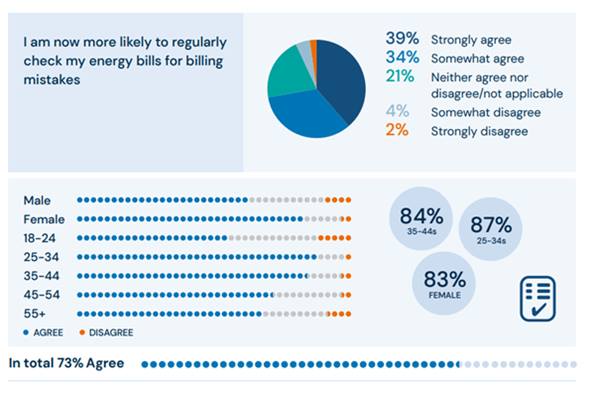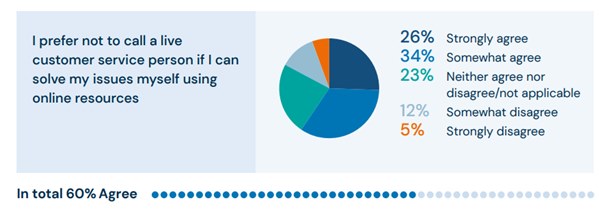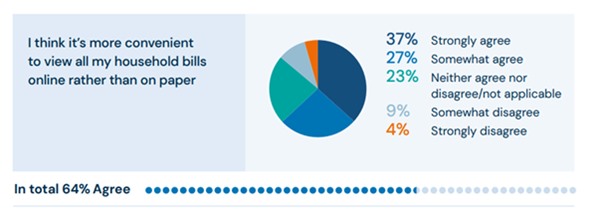
The UK energy sector is hitting crisis point right now. We have already seen big names going out of business.
Customers are enduring the pain of unprecedented price rises.And there is more to come this autumn when the Ofgem price cap will increase again.
With so much attention on prices, it may seem irrelevant to talk about customer service. However, research conducted by Macro 4 suggests that utility companies should be keeping a close eye on the service they provide to customers. We found that 58 per cent of energy customers expect higher levels of service in return for having to pay higher bills. So, there is every reason to try to get a better understanding of the aspects of service they see as important.
We commissioned a survey of 1,000 household energy and water bill payers which asked them about the service they expect from suppliers. Based on the results, here are five key things they care about aside from the price they pay for their utilities.
1. Billing accuracy
Clarity and accuracy of billing should be a given in a regulated industry, but the survey responses suggest that many people are not confident about whether their bills are a true reflection of their usage. With prices rising this is becoming an even bigger issue. After the price cap was announced, nearly three quarters (73 per cent) of bill payers we asked said they are now more likely to regularly check their energy bills for mistakes. And 42 per cent felt their current energy supplier could improve their service by making sure their bills are accurate.

One issue to address is overly complex billing. What can utilities do to make tariffs simpler and bills clearer? Nearly a third (31 per cent) of people said their energy supplier needs to make their bills easier to understand.
Thankfully in most cases bills are in fact accurate, so what people are really looking for is reassurance. The best way to address this is to make it easier for customers to check their bills for themselves, for example by giving them online access to historical billing information, together with basic analysis facilities. By allowing customers to compare billing and usage rates over time – or even benchmark against similar households that live in the same area – utilities can show that they are being more transparent and inspire greater trust.
2. More self-service
Customers are becoming more open to digital interaction, including online self-service – a trend intensified by COVID-19 lockdowns over the last two years. 61 per cent of the utility bill payers we questioned said they have become more used to interacting digitally since the pandemic. And 72 per cent now want companies to provide online resources that make it easy to find information and resolve their questions themselves. In fact, 60 per cent would prefer not to call customer services at all if they can solve issues themselves using online resources.

There is no doubt, then, that customers are ready for self-service and will welcome more online tools and resources to help them become more self-sufficient. Energy companies should therefore review their online offerings and seek to plug any gaps. For example, are all the typical everyday queries that customers call or email about adequately covered by FAQs or other online resources? Are these materials and tools easy for customers to locate and do they offer a user-friendly experience? Is it possible to provide online access to a broader range of customer data and documents (such as correspondence, contracts and meter readings as well as bills)?
3. Better complaint handling
Complaint handling is a critical area that can be a trigger for customer defections. So, it is concerning that one out of four (25 per cent) energy customers in the survey are unhappy with how quickly complaints are being resolved by their existing suppliers. For water companies it is one out of five.
At times there will be practical or technical reasons why complaints cannot be resolved immediately. However, the research suggests companies could do more to reduce the wider frustrations around customer communications and complaint handling.
For example, around a third of energy customers and a quarter of water customers want their suppliers to let them make contact in whatever way they prefer, whether by phone or using online channels including email, messaging and social media. And more than a quarter say it’s important that staff are given access to relevant customer information when taking calls.
The good news is that supporting multiple channels in a more integrated way allows companies to better prioritise agent time and resources as well as keeping customers happy. For example, online chat and messaging can be used to deal with routine queries – helping to reduce the number of incoming phone calls for the customer services team to handle. Interaction with a human customer service agent can be reserved for the most pressing or complex queries, or when frustrated customers need understanding and empathy. The key to success is linking the two channels together – monitoring automated chat and proactively handing over queries to a real person when a bot cannot provide the answer, or at the first sign that a customer is becoming frustrated.
4. Online billing
Close to two thirds of bill payers say it’s more convenient to view all their household bills online rather than on paper. This opinion is consistent across all age groups, from younger digital natives to the over 55s. However, ditching paper altogether is not yet an option for suppliers since nearly a third (31 per cent) of respondents still prefer paper bills.

To meet growing demand for online billing, utility companies should consider how they can enhance their digital services, for example by supporting a greater range of delivery channels, and creating new billing formats to suit different channels. For example, a bill sent by text should be short and simple, whereas presenting a bill on a website or app enables utilities to differentiate by turning the traditional static bills into a more interactive communication. Again, there is the opportunity to provide digital tools to help customers better understand their charges, manage their usage and budget for the future.
5. Commitment to environmental and social responsibility
With environmental issues now a widespread concern, it’s not surprising that a high number (70 per cent) of customers said it is important that their energy or water provider is helping to protect the environment. Over a third (37 per cent) are willing to pay a little more on their bills for suppliers to invest in becoming more environmentally friendly. And this jumps to 57 per cent among the 18-24 age group.

Similarly, 90 per cent said that providing support for people who find it hard to pay their bills is important in a water or energy provider. One in five (22 per cent) of bill payers was looking for financial support with bills from their current energy supplier and 29 per cent wanted more advice on saving energy to reduce bills.
With energy and other household bills rising significantly and the general cost of living also on the increase, it’s natural that pricing is the overriding issue when people think about the household utility sector. At the same time, it is important to recognise that meeting service expectations is essential for satisfying customers and building loyalty – particularly in a market where there is less scope for price differentiation. People are looking for more transparent billing and a joined-up customer service offering. When they interact with their utility suppliers, they want a choice of ways to get in touch, incorporating digital self-service. If they choose to use the phone, they need to feel that the person they’re put through to will have the necessary information at their fingertips to resolve queries quickly. And today the majority of customers also expect companies to demonstrate social and environmental responsibility.
About the Author
Lynda Kershaw is marketing manager at software and services company Macro 4, a division of UNICOM Global. A marketer with over twenty years’ experience, Lynda helps organisations use technology to personalise customer interaction, improve customer experience and make a painless transition to digital communications. www.macro4.com.




